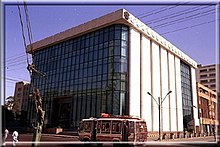It has been suggested that Sandstorm report be merged into this article. (Discuss) Proposed since July 2024. |
 | |
 | |
| Company type | Private |
|---|---|
| Industry | Banking |
| Founded | 1972 |
| Founder | Agha Hasan Abedi |
| Defunct | July 1991 |
| Fate | Liquidation, forced closure |
| Headquarters | Karachi & London |
Area served | Worldwide |
Key people |
|
| Products | Financial services |
| Owner | Sheikh Zayed (77%) |
The Bank of Credit and Commerce International (BCCI) was an international bank founded in 1972 by Agha Hasan Abedi, a Pakistani financier.[1] The bank was registered in Luxembourg with head offices in Karachi and London. A decade after opening, BCCI had over 400 branches in 78 countries and assets in excess of US$20 billion, making it the seventh largest private bank in the world.[2][3]
BCCI came under the scrutiny of financial regulators and intelligence agencies in the 1980s, due to concerns that it was poorly regulated. Subsequent investigations revealed that it was involved in massive money laundering and other financial crimes, and had illegally gained controlling interest in a major American bank. BCCI became the focus of a massive regulatory battle in 1991, and, on 5 July of that year, customs and bank regulators in seven countries raided and locked down records of its branch offices[4] during Operation C-Chase.[5][6][7]
Investigators in the United States and the UK determined that BCCI had been "set up deliberately to avoid centralized regulatory review, and operated extensively in bank secrecy jurisdictions. Its affairs were extraordinarily complex. Its officers were sophisticated international bankers whose apparent objective was to keep their affairs secret, to commit fraud on a massive scale, and to avoid detection".[8]
The liquidators, Deloitte & Touche, filed a lawsuit against the bank's auditors, Price Waterhouse and Ernst & Young, which was settled for $175 million in 1998. By 2013, Deloitte & Touche claimed to have recovered about 75% of the creditors' lost money.[9]
BCCI continues to be cited as a lesson to be heeded by leading figures in the world of finance and banking. In March 2023, the United States' Acting Comptroller of the Currency Michael J. Hsu stated that "there are strong parallels between FTX and the Bank of Credit and Commerce International – better known in bank regulatory circles as BCCI – which failed in 1991 and led to significant changes in how global banks are supervised."[10]
- ^ Adams and Frantz, p. ix.
- ^ Kanas, Angelos (May 2005). "Pure Contagion Effects in International Banking: The Case of BCCI's Failure" (PDF). Journal of Applied Economics. 8 (1): 101–123. doi:10.1080/15140326.2005.12040620.
- ^ "Biographical data on Agha Hasan Abedi". Salaam Knowledge.
- ^ Trento. Prelude to Terror. p. 370.
- ^ "The BCCI Affair – 8 BCCI and Law Enforcement – The Justice Department and the US Customs Service". irp.fas.org. Archived from the original on 13 September 2021.
- ^ Lohr, Steve (22 November 1991). "Agent Tells Of Failures On B.C.C.I." The New York Times. Archived from the original on 25 January 2017.
- ^ Castro, Janice (24 June 2001). "The Cash Cleaners". Time. Archived from the original on 10 June 2020.
- ^ Kerry, John (6 October 2011). The BCCI Affair: A Report to the Committee on Foreign Relations. Lulu.com. p. 60. ISBN 978-1-105-09685-3.
- ^ "BCCI bank fraud begets silver lining 13 years later". Deloitte.com. Archived from the original on 20 November 2007. Retrieved 28 February 2009.
- ^ "Acting Comptroller of the Currency Michael J. Hsu Remarks at the IIB Annual Washington Conference "Trust and Global Banking: Lessons for Crypto"" (PDF). Office of the Comptroller of the Currency. 6 March 2023. Retrieved 21 June 2023.